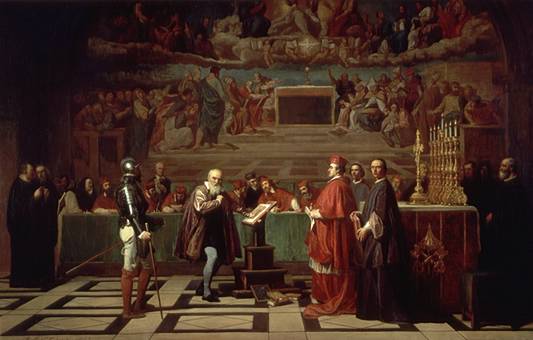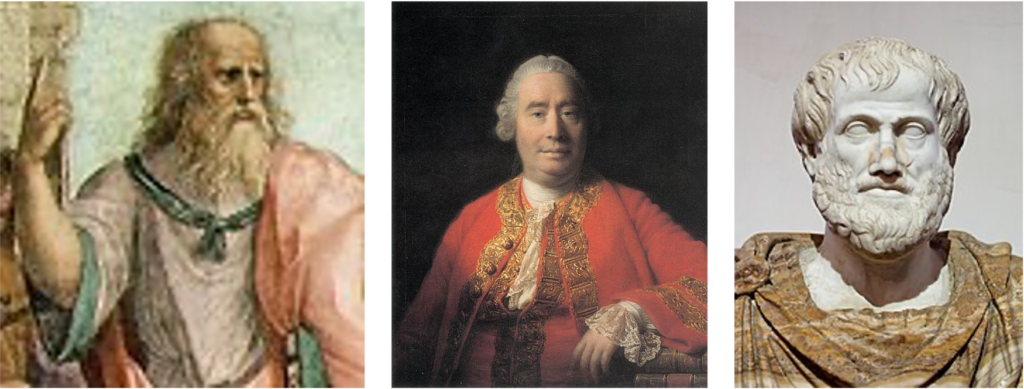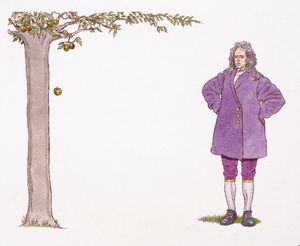History of social sciences week!
I’m a big fan of books on the history of science. I like to find out about the whole story: how things got started in Ancient Greece with people disputing traditional views, how it continued during the Renaissance with scientists starting to test their theories experimentally, and on into the explosion of knowledge in the twentieth century. I also like the well-known characters and the charming (and often imaginary) vignettes about them: Galileo and the tower of Pisa, Newton and the apple, Mendel and the peas.
I like the settings, the Agora, the Sorbonne, the Royal Society. I like the twists and turns of the plot (Galileo forced to retract his theory or Darwin discovering that Wallace is about to publish the theory he had worked on secretly for twenty years).
 Picture: The trial of Galileo by Joseph-Nicolas Robert-Fleury
Picture: The trial of Galileo by Joseph-Nicolas Robert-Fleury
I like the detours through Arabic and Chinese science (and always regret their neglected role). And of course, I like the history of science itself, how problems are discovered (why do organs seem to have a function?), hypothesis proposed along the way (the heritability of acquired characteristics for instance) and explanations found (natural selection)–what Steven Pinker calls the "blissful click, the satisfying aha!, of seeing a puzzling phenomenon explained."
I like all these things, but one thing always disappoints me. It is the absence of social sciences.
General histories of sciences are all about mathematics, physics and biology. It is as though there were no social sciences, or like they didn’t have any history! Of course, you can find books about the history of psychology or the history of anthropology. But they aren’t the same. First, they always start with the first "official" representatives of each discipline: James or Wundt for psychology, Maine or Frazer for anthropology, Durkheim for sociology (or Comte or Montesquieu if you are lucky). What about Aristotle's work on constitutions? And Plato's questions about the evolution of language? Or Hume's theory of emotions? Hume's masterwork is even called "A Treatise on Human Nature." Isn’t this relevant for the history of anthropology?
I guess not since philosophers' works do not belong to history of science but are rather gathered under a vague label called "history of thought" or "history of ancient philosophy". Poor Hume whose project consisted explicitly in extending to human sciences the method of natural sciences!
 Picture: Three famous anthropologists of the past
Picture: Three famous anthropologists of the past
But it gets much worse. Typical textbooks are written as though the history of the social sciences was just a succession of thinkers or paradigms: "In the beginning were the evolutionists, they claimed this and that. Then came the functionalists who proposed this other thing and that one different thing. They were then replaced by structuralists." And so on.
My main problem with this kind of history is that it is not written from today's perspective. It does not make use of contemporary concepts and theories. The consequence is that you lose a big part of what makes the history of science so interesting which is to see how people discovered what we consider today as the main problems and how they prepared the way for what we consider to be the best theories. You also lose the sense of progress, the interesting succession of conjectures and refutations. In other words, you lose the "blissful click" and the "satisfying aha!"
In the natural sciences, by contrast, scientific work is put into today's perspective. In biology for instance, we learn about the history of the discovery of the theory of natural selection in the light of modern genetics and modern paleontology. We can see which problems Darwin had to face (he could not see the genes for instance) and why Lamarck was on a wrong track (because he did not consider selection). We also see how Darwin's concept paved the way toward new concepts such as reproductive success, evolutionary stable strategies, or the modern gene-centered view of evolution.
Why is there a difference between the natural and the social sciences? Are the social sciences so alien to the idea of progress and discoveries? I don't think so. I think that there is a story to be told about in which it would be shown how ancient scientists tackled the same questions as today and how their answers are related to today's theories. For instance, there would be a great story to tell about the problem of cooperation, the prisoner's dilemma, the tragedy of the commons and the supply of public goods, starting with Hobbes and his institutional solution (the Leviathan) and continuing on through Hardin and Ostrom. On a related topic, there are many similarities to be uncovered between Franck and Trivers's modern theory of moral emotions as an adaptation to enhance one's moral reputation and Montaigne or Hume's reflections on the imperfection of purely Machiavellian strategies (David Gauthier's Moral by Agreement is wonderful example of a history of cooperation–as well as a great theory of morality–informed by modern theory of games).
[3 PICTURES]
Pictures: Ancient and modern ways of studying the supply of public goods
Similarly, it would be interesting (as I suggested in an earlier post) to compare the modern theory of massive modularity and the XVIIIth century's theory of the plurality of passions (on this matter, the only good history of psychology from today's perspective that I know is the one by Jon Elster on the study of emotions by Aristotle and the French moralists [1]; see also his recent work on Tocqueville as a social scientist [2]). We may find that Aristotle or Descartes's carving up of mental functions map very well onto modern evolutionary psychology, or that Hume and Reid were the precursors of the study of epistemic vigilance (or, as Ryan Nichols told us recently on this blog, that Hume was a supporter of the by-product theory of religion [3]).
What do you think, dear readers? Have you encountered the kind of history of social sciences I'm thinking of?
If you have not, but if you think that such kind of a history is possible, I propose to contribute to this story yet to be told by relating your own research to the anthropologists philosophers of the past?
In the meantime, I'll do my share of the work. In the next couples of days, I'll try to convince you that one can find the precursors of concepts such as reflective knowledge, ultimate causes, mirror neurons and moral modules more than two hundreds years ago. To do so, I'll focus on one man, who is a famous economist, but (again), an unknown anthropologist: Adam Smith.
I like the detours through Arabic and Chinese science (and always regret their neglected role). And of course, I like the history of science itself: how problems are discovered (why do organs seem to have a function?), hypotheses proposed along the way (the heritability of acquired characteristics for instance) and explanations found (natural selection)—what Steven Pinker calls the "blissful click, the satisfying aha!, of seeing a puzzling phenomenon explained.".
[1] Elster, J. (1999). Alchemies of the Mind: Rationality and the Emotions. Cambridge University Press.
[2] Elster, J. (2009). Alexis de Tocqueville, the first social scientist. Cambridge University Press.
[3] Hume, D. (1793). The natural history of religion.




Dan Sperber 27 June 2011 (18:53)
It is refreshing to read Nicolas complaining, without any hedges or caveat, that history of the social sciences [quote]“is not written from today's perspective. It does not make use of contemporary concepts and theories. The consequence is that you lose a big part of what makes the history of science so interesting which is to see how people discovered what we consider today as the main problems and how they prepared the way for what we consider to be the best theories.”[/quote] As he must be aware, this backward-looking approach to history of ideas is anathema for many, probably most historians of science. And for serious reasons, I believe. Just as an anthropologist, an historian has the task of understanding a culture (or fragments thereof) from within, to pay attention to what the people she studies paid attention to, to what their actual goals, sense of achievement and frustrations were, and not to commit the fallacy of seeing their ideas as imperfect attempts to anticipate ours. This is not to deny there are cases where past scholars may have tried to answer the same or almost the same questions that puzzle us or, in some case, that we think are now properly disposed of, but it is all too tempting to read all or most of past science in this light, without much concern for a proper understanding of the ancient scholars’ perspective. On the other hand there is also room for the kind of history of science book that Nicolas particularly like (and that I like too). It teaches us lessons of modesty and is often also a source of inspiration. To what extent and in which ways did past research address our present concerns is a serious, relevant question. It is also a much more difficult question than it may seems. A bias to see commonalities across schools and centuries may help bring them to the fore, or it may lead us astray (just as may an a priori relativist bias to exclude that this may ever be so). A long time ago (in 1969), I translated into French (with Nelcya Delanoë) Noam Chomsky’s [i]Cartesian Linguistics[/i]. It is the kind of historical book that Nicolas wants: Seventeenth Eighteenth and early Nineteenth Century grammar and philosophy of language is interpreted as raising the same fundamental issues that Chomsky put at the center of his approach, and, in many cases as anticipating central ideas in generative grammar. I like that book. At the time it came out, Michel Foucault’s work on the philosophy of language and on particular on the Grammaire de Port-Royal – with a group of friends we had asked him for a preface to the republication of this classical piece and, to our grateful surprise, he obliged – was on the contrary radically opposed to this kind of deliberate anachronism. The many discussions I was involved in at the time convinced me that the two approaches were justified and could benefit from one another.
David Hirshleifer 24 January 2012 (07:29)
Your idea for a history of social sciences book is great! I hope you write it, I'd love to read it.
Per Frank's and Trivers' modern theory of the moral emotions: in the interest of both nepotism and history of social science, I'll mention Jack Hirshleifer's 1987 paper on emotions as means of commitment.
See also the nice overview of emotions as commitment by Randolph Nesse, “The evolution of subjective commitment.”
Hirshleifer, Jack (1987), "On the emotions as guarantors of threats and promises," In The latest on the best: Essays in evolution and optimality, edited by John Dupre, 307-326. Cambridge: MIT Press.
Randolph Nesse, (2001), “The evolution of subjective commitment,” ch. 1 of Evolution and the Capacity for Commitment, Edited by Randolph M. Nesse, Russell Sage Press, New York, 2001
Nicolas Baumard 24 January 2012 (22:26)
Thank you very for your encouragement. I hope indeed that I'll find the time to pursue this project one day! I agree with you that Jack Hirshleifer' paper is often ignored. Dan Sperber and I actually cite it in a paper to appear in Mind and Language on moral reputation and evolution.
The paper is here:
http://sites.google.com/site/nicolasbaumard/Publications/Baumard%26Sperber2010Draft.doc?attredirects=0